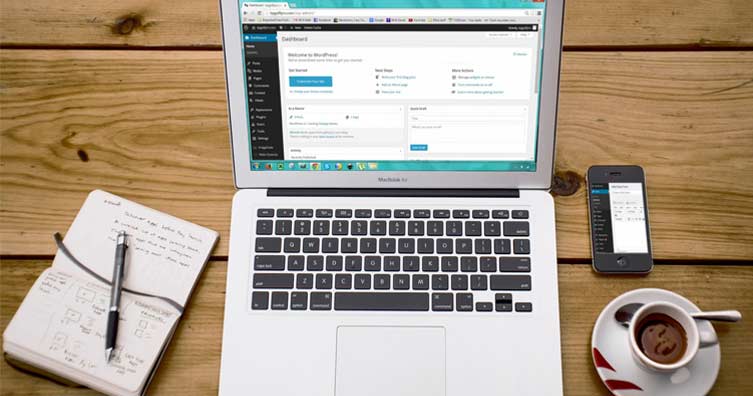How to make money from blogging in 2025
Think blogging's just a hobby? Think again – it can actually make you quite good money. Here's how to get started, find your niche and turn your blog into a profitable business.

We'll be honest: blogging isn't the easiest way to make money. But, the great thing is that anyone can do it, it looks amazing on your CV and the earning potential is enormous.
All you need is something interesting to say and enough patience and dedication to build traffic and a following.
But how do successful bloggers make their money? We've interviewed some of them to reveal their monetisation secrets.
Our guide gives you a concrete action plan to get your blog off the ground and grow it into a profitable business from home.
What's in this blogging guide?
How to start a blog

Credit: astarot – Shutterstock
Before you can start earning money from your blog, you need to create one. By picking the right blogging platform and a niche that suits you, you can set yourself up for success.
Choose a blogging platform
You have two main options when it comes to setting up a blog: you can use a free blogging platform, or you can create your own website. We'll take you through both, outlining their pros and cons.
Free blogging platforms
- Best for – Casual bloggers and those not interested in making money from their blog
- Pros – Easy to set up and completely free
- Cons – Limits on customisation and video/image upload, you often can't place adverts or use affiliate links, you can't create a custom URL and the platform retains the right to delete your blog.
Blogging platforms like WordPress.com, Blogger and Medium let you set up a blog for free. They're very easy to use and a great choice if you want to start blogging casually at first. However, free blogging platforms are very limiting.
There won't be many customisation options, and the storage limit will be minimal, making it harder to upload videos or images. Another drawback is that your blog URL will be something like 'www.yourblog.wordpress.com' with the platform branding.
Most free blogging platforms also don't allow you to place banner adverts or affiliate links on your site, which are key revenue streams for most bloggers. If you do want to earn money from your blog, it's better to create your own website, as we explain in the next point.
Create your own website
- Best for – Dedicated bloggers and those looking to make money from their blog
- Pros – Complete control over design and customisation, your own custom URL and the ability to use adverts and affiliate links how you like
- Cons – You'll have to pay for your domain name (URL) and for hosting, but we've got tips on cheap web hosting.
If you're not particularly tech-savvy, the thought of creating your own website might seem quite scary. But in reality, it's actually pretty easy to do, and you can create one in just 20 minutes.
Save the Student's founder, Owen Burek, has written an easy-to-follow, step-by-step guide to show you how to start a website.
With your own website, you'll be able to create unique personal branding (with your own URL), and there's no risk of your blog being deleted by the platform. You'll own the site and be in complete control.
WordPress has a huge number of templates or 'themes' for you to choose from. Take the time to pick one that suits your personality and the topic of your blog.
Opt for something clear and simple, with space for large images and easy-to-read fonts (Comic Sans and Courier fonts are generally no-nos).
Finding the perfect blogging topic

Credit: Boiarkina Marina – Shutterstock
Finding the right topic to focus on can either be the easiest or the hardest part of starting your blog.
The most important thing at this stage is to choose a niche in which you can call yourself an authority or expert. The biggest mistake new bloggers make in such a crowded blogosphere is starting a blog without trying to do something surprising or different.
For example, instead of creating generic fashion content, you could combine your love for clothes with your concern for the environment by blogging about environmentally-conscious designers.
These are the best ways to find a topic for your new blog:
- Look at other blogs – This should be your first port of call. What's already successful? And more importantly, what's missing? Find the gaps in the market.
- Use Google – What are people searching for? Use Google's suggested searches and autocomplete to discover what people are looking for. If others are searching for something, that shows there's a demand.
- Search forums for common FAQs – When people can't find answers to their questions, they go to forums. What are they asking? What do they need advice on? This will show what people are interested in and what there's a lack of available information on.
- Track current trends – What topics are in the media right now? It's good to pick a topic with longevity, but if you can piggyback on a trend early on, you can quickly establish yourself as an expert on it before anyone else. See what's trending on TikTok and search #journorequest on X (formerly Twitter) to see what kind of themes journalists are currently reporting on.
- Think about different types of content – Could you do tutorials/how-to guides? Reviews? Interviews? Lists? It might not be what you write about, but how you write which sets you apart.
- Identify your own interests and passions – While all of the above are important, there's no point in blogging about something you have zero interest in. You'll quickly get bored and people will spot your lack of enthusiasm. Write about something you truly care about.
How to make money from blogging
Here are the best ways to make money as a blogger:
-
Use affiliate marketing on your blog

Affiliate marketing works by adding tracked affiliate links to the text of your blog. You can make a small commission every time a reader clicks through to a site you recommend and makes a purchase.The links will lead readers to the website of a brand, and the money you receive is to say 'thanks' for sending some of your lovely readers to their site.
Almost all online eCommerce websites have an affiliate program of some sort, like Amazon, ASOS and Apple.
You can start by signing up to Awin. This is a huge affiliate network where you can promote thousands of well-known brands and services from around the world.
Money-saving blogger, Claire Roach, revealed:
We mainly use affiliate marketing as our main source of revenue, although there's also Google AdSense on there for an extra few pounds each month.
Affiliate marketing is a natural fit for many bloggers. Writer Ceri Jones suggested:
As a blogger, you're always recommending products and services to your readers. A lot of companies offer affiliate programs so it's really easy to find relevant programs to join and start earning commission.
The key is to be authentic and genuine with affiliate marketing. Write reviews and articles with your honest opinions and only encourage your readers to buy something if you think it's a good product or service for them.
-
Add banner adverts to your website
As a more visual way of advertising, you can sell banner advertising space on your blog to brands that relate to your readers. They're commonly placed inside articles or in the sidebar.
While you can sell ads individually to companies, it's often easier to do this through a network. The network takes care of the advertisements that are shown and picks the best and most profitable ones for your website.
When you've just launched your blog and you don't have a lot of views yet, Google AdSense is a good place to start. They don't have any minimum monthly view requirement to join.
However, once you start to grow your blog, you can look at companies that pay more. For these, you will need a minimum number of monthly readers. The best ones include Monumetric (10,000+ monthly views), Mediavine (50,000+ monthly sessions) and Raptive (100,000+ monthly views).
They will pay you every time a visitor clicks on an advert (CPC, cost per click), or per 1,000 impressions (CPM, cost per impression). The cost of these depends on what company is advertising, how often it is shown, what niche your site is in and where your readers are based.
Our former content editor, Nele van Hout, uses display ads to earn money from her travel blog:
I joined Monumetric when my travel blog hit 10,000 monthly views and I got paid around $10 CPM on average. Once the blog grew and I hit 50,000 monthly views, I switched to Mediavine and my CPM went up to around $17 on average.
CPM varies a lot throughout the year. Q1 sees a much lower ad revenue while Q4 is the best time to earn money through display ads, as brands are spending more money on advertising. Either way, once you've grown a steady stream of traffic to your site, display ads are a very easy way to create passive income from your blog.
-
Write advertorials and sponsored content
According to the bloggers we spoke to, one of the best ways of monetising a blog is through offering sponsored content opportunities (or advertorials). These are essentially adverts in the form of a paid-for article or blog post.
As an example, if Adidas brings out a new swimwear line and you have a blog on women's sportswear, they might pay you to write an article about their range. You may also be able to add some affiliate links on top.
This monetisation method usually works best when you have a strong niche audience. Once you've grown your readership, brands will often approach you to discuss sponsored posts.
As Kenzie Harvey, from beauty, fashion, lifestyle and travel blog LemonaidLies said:
I have only ever had sponsored content opportunities come to me though PR companies, either directly or through apps like the [influencer] agency TAKUMI.
Note: If you're accepting sponsored posts on your blog, make sure you're up to date with the latest advertising regulations. For example, you have to disclose that you're being paid to post a sponsored article on your website.
-
Charge for sponsored social media posts

Credit: Flamingo Images, Pinone Pantone, Avector – Shutterstock
If you have a strong social media presence connected to your blog, you'll be very attractive to brands. There's the potential to charge per post/re-post and the fees can be surprisingly high.
You'll just have to work hard on building your followers first. Your 'social proof' (or how many people follow you on social media) is seen by brands as evidence that readers will like what you post about them, too.
-
Write guest blog posts for media outlets
Occasionally, members of the press (or even a brand who has their own blog) will reach out to you if you're an authority on a certain topic. They might ask you to make a little cameo appearance on their website.
If, say, you're knowledgeable about cooking on a budget, a newspaper might ask you to contribute some cheap recipes to their cooking magazine.
Don't be shy in pitching ideas to publications either. If editors don't know who you are, a quick email intro is a great way of getting your blog's name out there.
-
Work with an agency to build your blog
Blogging has become so popular in the advertising world that there are now agencies exclusively catered to promoting bloggers to big brands.
Working with an agency can be super lucrative and it offers you security. However, you'll need to have a pretty decent following to be scooped up in the first place.
Agency fees are also incredibly high, meaning only the biggest brands will be able to afford to work with you, and smaller independent ones may be scared off.
Depending on the nature of your blogging business, this may or may not work to your advantage. To use the example of ethical fashion blogging again, agency fees might prevent you from working with the small independent designers you really want to promote.
-
Sell digital products on your blog
If you have skills or advice to offer, another option is to charge a fee for access to eBooks, video tutorials, courses or workshops.
In order to make this option work, you need to be able to show you're excellent at what you do, or that your content has proven to be incredibly valuable. This isn't easy.
It can be pretty difficult to convince online communities to pay up, as there's a tendency for people to think everything online should be free of charge. But it's worth a try!
-
Sell your blog's newsletter space
It's also an option to charge a brand for either advertising space or a mention in your weekly/monthly newsletter (if you have one!). It'll take very little time to do, and you could get a fair amount of money for it.
However, you'll need to build up a decent-sized mailing list for brands to consider this.
-
Get employers' attention as a blogger
Using your blog to promote your own business or even land yourself a job are other (albeit indirect) ways to make more cash with your blog.
If you're one of the many students selling stuff online, your blog is the perfect platform to promote what you have to offer. However, don't go in too hard, or you'll put readers off.
You can also use your blog as a sort of online profile. It's a place to build credibility, show your skills and hopefully, you can get a good job out of it.
Think of it this way: your blog is like your own small business in itself. By showing potential employers that you can do this successfully, you're showing that you've got an entrepreneurial mind, and know how to achieve success with it.
Nele van Hout used the blog she started during university to land her first graduate job:
I started my travel blog in my second year of university. It taught me invaluable skills in digital marketing and SEO, something I wasn't learning in my Creative Writing degree.
After graduating, I used my blog to show potential employers that I knew how to use SEO and digital marketing to grow a website. I landed my first graduate position as digital marketing assistant and was tasked to improve the SEO on their website and company blog.
Our content editor, Lauren Allen, has also gained freelance opportunities through her blog:
A few years ago, I started offering writing and editing services on a freelance basis. At this point, I'd been running my blog for several years and it served as a portfolio to showcase my skills.
I've even had some companies reach out to me personally to ask me if I'm available for freelance work. You never know what kind of opportunities could arrise!
How to increase your blog traffic

Credit: Kaspars Grinvalds – Shutterstock
To start earning money from blogging, you need readers. You can't just expect people to magically find your blog and start reading it. You have to promote it!
Here are the best and easiest ways to grow your blog:
-
Write SEO content
Learning SEO and writing SEO-optimised content is a great way to build a steady stream of traffic to your website. SEO stands for Search Engine Optimization. This essentially means that you're optimizing your content to rank higher on search engines like Google and Bing.
SEO is a complex set of practices, but it boils down to finding search terms that fit the user intent of your ideal reader. If you optimise your blog posts for these terms, search engines can rank them higher in the search results. This way, people will find your blog posts when searching the web.
Google's SEO Starter Guide is a good first resource to check out, but there are countless free courses online to try too.
-
Promote your blog on social media
As with any business nowadays, you're unlikely to get noticed if you don't have social media accounts.
We recommend setting up pages/accounts for your blog on Facebook, X, Pinterest, Instagram, TikTok, and LinkedIn. Design these accounts in a similar colour scheme/theme to your blog so your brand is consistent and easily recognisable.
Use them to share new posts and tag fellow bloggers/influencers/companies who might share your content and help it reach an even bigger audience.
You could also dabble in paid advertising to help your blog reach a wider audience or run a competition to generate more likes. Once you've got the followers, keep them interested by posting on a regular basis (not exclusively about new blog posts).
Lauren Allen, uses social media to drive traffic to her blog:
These days, it's more important than ever to diversify. If you only rely on one traffic source, you could easily lose your income overnight due to algorithm changes.
However, I highly recommend mastering one platform first before moving on to the next and you should consider which platforms your target audience are more likely to use.
Running several social media accounts is a lot of work, but you can make it easier by scheduling your content in advance. Personally, I spend a few hours on this every Monday and it allows me to analyse what worked well and what didn't. This then impacts the content I share for the following week.
We share more tips for running social media accounts in our guide to becoming an influencer. -
Connect with other bloggers
Make yourself known to other people who blog about similar topics. Despite the fact you're technically a competitor, you're likely to be pleasantly surprised by how supportive the blogger community can be.
You can write guest posts for them in exchange for a link back to your website. This could really help with your SEO.
If you engage with other bloggers and share their content, they'll likely return the favour. You could even work on some collaborations!
-
Respond to news stories on your blog
If something happens in the news which is related to your niche, get involved. This is known as 'newsjacking' and it can be an effective way to get your blog some exposure.
For example, if you blog about cheap student cooking, keep an eye out for things like the reveal of our latest National Student Money Survey. Surveyed students might spend an average of £48 a month on takeaways and eating out, but you could tell them how to spend less by cooking more meals from scratch.
You can get on social media to say your bit with relevant hashtags, get involved in discussions and even reach out to journalists to say you're available for comment.
If you're really great at owning your niche, journalists might even come to you.
-
Create viral content
Creating viral content will help you reach a new market and, in turn, increase your readership.
This might be easier said than done, but the key to creating viral content is to tap into controversial or highly discussed topics related to your niche blogging field. As you can imagine, this often involves newsjacking, as mentioned above.
As this is your niche, you'll be passionate and knowledgeable about it, so you can post an opinion that people want to read, share and discuss.
Tips on monetising a blog from successful bloggers
Building a successful and profitable blog takes time. Many bloggers only make pennies from monetising their blogs each month – and this is after having worked on their blogs for a while. But it really is possible to earn a good blogging income if the website takes off.
Nele van Hout believes building your traffic is the most important part of monetising your blog:
It took nearly five years building up my blog and constantly changing strategies before I started to earn a full-time income from it. Before this, I was earning a couple of hundred pounds here and there from affiliate marketing and the odd sponsored posts.
While it can be tempting to start monetising straight away, focusing on quality content and growing your audience should be your top priority. The more readers you have, the better you can monetise it in the long run.
I started to earn a full-time income from my blog when I hit 50,000 monthly sessions and joined Mediavine. As my traffic kept increasing, the number of affiliate sales was also multiplying. It truly felt like a snowball effect, all the years of hard work that I put in prior were paying off.
To have a chance of creating a full-time income through blogging, you need to have multiple income streams from a selection of sources.
Many bloggers decide to monetise quite early on in their blogging journey. Blogger Urszula Makowska explained:
I started blogging [...] when I was in college. I decided to monetise my blog because I was putting in a lot of time and effort to create posts, paying photographers for shoots, and I also wanted to be a blogger full time. I love blogging and I wanted to follow my passion to making a full-time career in blogging; it brought me happiness.
Another big challenge faced by bloggers is competition. Kelle, from the lifestyle website Kelle's Space, suggested:
It's a challenge competing with so many bloggers in the same niche as me for opportunities; work for bloggers is quite scarce.
The blogging market is saturated with lots of aspiring bloggers fighting to be seen. However, if worked on with dedication and consistency, it is possible.
Ceri Jones has previously said:
Blogging is definitely a challenge because it takes a lot of commitment and consistency to be able to monetise it properly. The only thing I regret is not starting sooner.
I managed to make my first £50 in my first month of monetising, and this month I've made just over £200. I'm now starting to be contacted by companies for sponsored posts, so hopefully my monthly income will continue to increase!
Can you really make money from blogging?
As we have seen, the answer is yes! But how much money you can make from blogging is variable. That's the nature of monetising a blog at the start. However, once traffic starts to build, bloggers can do very well. The more readers you have, the more attractive you are to advertisers.
We touched on this earlier, but having multiple income streams can help you earn good money from blogging. If you can, it's best to do this through numerous sources.
Check out these super important tax facts – they'll come in handy when you start making money from blogging.








